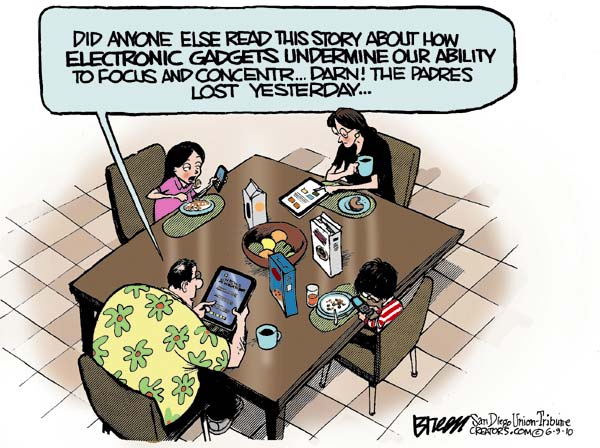Larry Cuban on School Reform and Classroom Practice: High Tech: Addiction or Dependency?
The following post is one of a small group I have written over the past 13 years that have attracted the most readers. This one originally appeared in 2010. I have revised and updated it.
Over the next month or so, I will revise other posts that have drawn the most viewers.

The New Yorker cartoon about the decrease in Neanderthal communication when the technology of fire was invented pokes fun at the current hullabaloo over users’ addiction to smart phones, iPads, and laptops. As this cartoon does.

Recent media stories have played out two sides of an ancient argument. Consider ancient Greek philospher Socrates’ take on the invention of writing: “[it] will create forgetfulness in the learners’ souls, because they will not use their memories; they will trust to the external written characters and not remember of themselves.”
Whenever access to new technologies increased the flow of information such as the printing press, telegraph, telephone, computer, and now smart phones, there were those who argued that such technologies reduced communication among friends and family, eroded a sense of community, increased isolation of individuals, and even made people dumb.
For example, recent articles on new technologies have claimed that PowerPoint reduces analysis to simple bullet points, Google makes us stupid, and Twitter compresses our attention span to that of a gnat. Moreover, these electronic technologies hook users to such a degree that civility and communication among friends and family are sacrificed to repeated fixes of email, Facebook, Twitter, and text messages.
Finally, there is a scary cognitive side to this argument. Neuroscientists claim that new technologies, particularly, social media and the geyser flow of information have changed how we think and behave. In short, our brain on computers undergoes re-wiring as we use daily–nay, hourly–laptop, and desktop computers, smart phones, and other electronic devices. Experience, then, alters the brain.
The other side of the argument is two-fold. First, cognitive scientists question seriously the trademark multi-tasking that gadget users trumpet repeatedly and the re-wiring of the brain. Studies, they say, have made them skeptical of these inflated claims.
Second, the metaphor of drug addiction is rhetorical overkill. The proper word is “dependent,” not addicted. Addiction is associated with individual choice to smoke, drink, and take drugs. It connotes personal weakness. Yet consider the spread of popular technologies as they have become habitual features of the culture. Think indoor plumbing, telephone, cars, planes, and television. They have become daily patterns in our lives. In short, Americans have become dependent on once “new” technologies. And that is normal. Addiction, however, is abnormal.
Dependency on technologies comes from job expectations (the charter chain of schools called KIPP issues cell phones to all of its teachers; many companies require employees to be available 24/7), family responsibilities (staying in daily touch with Mom or Dad), friends’ acquisitions (oooh, she has an iPad), augmented communication for the disabled, and dozens of other sources. All these pressures normalize the use of new technologies creating dependency on apps and high-tech hardware for both good and ill.
Now here is the kicker that undermines both sides of the argument. Recent surveys have established that children and youth spend nearly eight hours a day looking at media (cell phones, desktop and laptop computers, Mp3 players, television, etc.) not counting screen time in school. Except for the Alliance for Childhood and pediatricians, few, if any, civic leaders, business groups, and educational policymakers have questioned the ubiquity of 1:1 laptops, iPods, Kindles, and smart phones in schools. For those who rail at Moms talking on cell phones while toddlers scream for attention, for those who point fingers at colleagues being hooked on gadgets or addicted to cell phones, why have they not called a halt to giving each child a computer, given the huge amounts of screen time viewed daily? For those who fear that young, easy-to-mold brains get rewired as these devices are used daily in schools, where are the protests, the letters to the editor, the concerned citizens at school board meetings?
If re-wiring the brain and addiction to high-tech gadgets are rhetorical overkill–even hype–and the word “dependency” is more appropriate as technology continues to shape our daily habits for both good and ill, then perhaps it is time to ask publicly whether the school should be a willing, even eager, partner in deepening that dependency on gadgets with screens.
This blog post has been shared by permission from the author.
Readers wishing to comment on the content are encouraged to do so via the link to the original post.
Find the original post here:
The views expressed by the blogger are not necessarily those of NEPC.
